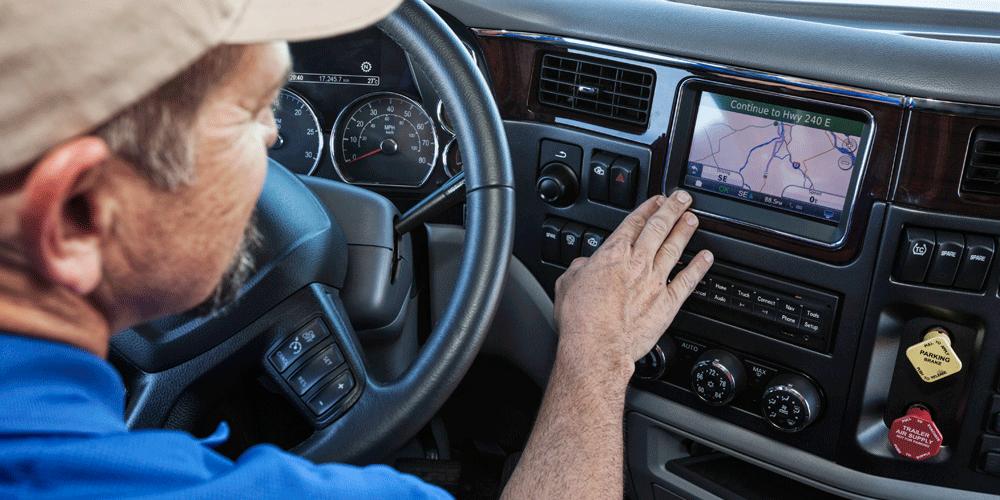5 Common Truck Driver Complaints and How to Get Respect
Kally started with ATS in May of 2015 as the orientation coordinator. She moved into a driver services role in March of 2017 and began dispatching drivers as a driver manager in March of 2019. She enjoys being a liaison for drivers and giving them a safe space to chat with someone as they move through their careers.
“R-e-s-p-e-c-t! Find out what it means to me!”
Most people know this song by Aretha Franklin from 1967. (If you don’t, pull up YouTube or Spotify and look it up.)
Respect. Let’s talk about it.
Respect and driver mistreatment is something that’s talked about a lot in the trucking industry. There are a lot of drivers like you in the transportation industry that simply aren’t getting the respect they deserve and that’s not okay. Every time a new driver is added to my fleet, I learn about how past carriers treated them. I do my best to treat them how they want to be treated.
I’m going to get into the nitty-gritty of it. As a driver manager at Anderson Trucking Service (ATS) who works with company drivers, I have heard it all. And I will be very honest with you: At times, I’m not just a driver manager. Sometimes I’m a counselor, too. Or a friend. Or an accountant.
I wouldn’t change a thing.
However, one thing I’d love to change is the mistreatment some of these drivers have experienced — yourself included. So in the hopes that I may help prevent you from having to deal with some of these bad situations, I’m going to address the most common driver mistreatment complaints I’ve heard in the trucking industry and give you strategies for avoiding them.
By the end of this article, you’ll have several tools in your arsenal to help you work through truck driver mistreatment or avoid it altogether.
So just like Aretha sang, let’s talk about r-e-s-p-e-c-t and find out what it means to you!
Complaint #1: Being Forced to Drive in Unsafe Road Conditions
As a truck driver, have you ever been encouraged to drive in unsafe weather conditions?
I’m not talking about a few sprinkles of rain or a snowflake here and there. I’m talking about a full-blown storm. Blizzard-like conditions with icy roads, heavy snow and heavier winds. A torrential downpour. Fog so thick you can’t see more than ten feet in front of your truck.
Even heavy winds on their own can be reason enough to get off the roads. For instance, consider that you’re a van driver and you have an empty trailer on your way to pick up a new load. Any bit of wind can send your trailer all over the road.
You might be used to having to push through it during inclement weather. You may be told by your current carrier to chain up during a storm. But the bottom line is this: If you don’t feel safe driving in the current weather and road conditions, you shouldn’t.
Some drivers are happy to put chains on their tires for extra traction and some believe that if the road conditions require them to chain up, that they shouldn’t be on the roads to begin with.
What You Should Do About It
Your carrier should never encourage you to drive in unsafe weather conditions. You should never compromise your safety to deliver a load. No load is ever that important — especially because it may end up in the ditch anyway if you push it too hard on bad roads.
When it’s raining heavily, you should drop your speed by one-third. When it’s snowing heavily, cut your speed in half. If you don’t feel safe on the roads, you make the call. Get to a safe shutdown point and call your dispatcher. Don’t feel like you need to call in the middle of the storm. A respectful, safety-minded driver manager will support your decision.
To try to prevent the potential for getting caught in a bad storm, factor the weather forecast into your trip planning. Whether you trip plan in the morning or at night, consider the forecast. Are you driving through areas that are supposed to get bad weather? Try to see if you can adjust your schedule to shut down or pass through before the storm hits.
If you are simply getting up in the morning, jumping in the driver’s seat and going, you should probably take some time to trip plan instead. You can ask your dispatcher for advice about trip planning and they can coach you on how to get started.
Complaint #2: Being Encouraged to Violate Hours of Service
You should never violate your Hours of Service (HOS) because you feel encouraged to do so. HOS violations are a big deal.
Each truck is equipped with an electronic logging device (ELD) that records drive time soHOS can be accurately recorded. Alerts are in place so that if you are coming up against your HOS, your dispatcher will get notified. If you only have a few minutes left on your clock for the day, you can expect your dispatcher to be calling you, asking you what’s going on and asking you to park.
However, despite the fact that clock violations can lead to major lawsuits for both the driver and the trucking carrier if drivers get into an accident, are pulled over and caught by the Department of Transportation (DOT) or are audited by the DOT, sometimes drivers are still encouraged to push it.
Some small carriers have been caught encouraging drivers to violate their HOS. A basic Google search will turn up numerous article results for carriers being shut down by the DOT or Federal Motor Carrier Safety Administration (FMCSA) for HOS violations.
So, it does happen. Sometimes drivers are still encouraged to deliver a load or hit a deadline whether or not it violates their clock.
What You Should Do About It
Remember that your CDL is your livelihood. Violating your HOS puts your CDL at risk and can take you out of the game completely. And unless you’re ready to pursue a different career entirely, you should protect your CDL and take regulations seriously — no matter what you may feel encouraged to do by your carrier.
It’s best practice to shut down well before your clock expires for the day. For example, with the drivers I manage, I like to see them starting to look for a parking spot with at least an hour left on their clock, not three minutes.
If you find yourself coming close to violating your HOS, trip planning is in your best interest and your driver manager can give you guidance on getting started. You should also make sure you have a clear understanding of your HOS.
Don’t try to use personal conveyance (moving your vehicle for personal use while off-duty) to finish up a delivery. That’s a lawsuit waiting to happen.
Complaint #3: Not Getting Home Time Requests Approved
Hands down, home time complaints are among the most common complaints drivers have.
It’s a tricky topic to address because most carriers should set a clear expectation regarding home time policies. Drivers shouldn’t start working for a carrier that can’t send them home as often as they want.
For instance, a driver who wants to go home every night but decides to work at a strictly over-the-road company is setting themself up for a lot of unhappiness. That isn’t the carrier’s fault (unless they lied about being able to provide nightly home time).
However, if your home time requests are never being fulfilled, that’s a problem.
There is also the chance that your trucking carrier could get a new account that provides temporary access to dedicated freight lanes. The dedicated freight lanes could get drivers home every weekend, but it’s only a temporary gig.
Drivers who drive these temporary dedicated lanes get so used to home time that they are upset when they go back to OTR driving and can’t go home every weekend. You have to adjust your expectations or find a company that will get you home every weekend by providing access to dedicated freight lanes.
What You Should Do About It
If you have specific home time requests, put them in with your dispatcher as far in advance as you can. Your dispatcher will not necessarily automatically route you home every two weeks. You need to put in your home time requests as well as the day you are ready to come back.
If you have an important appointment, a child’s birthday or an anniversary to celebrate, your driver manager should know at least two weeks in advance. The more notice, the better. Don’t call your driver manager at noon on a Friday in California and tell them you need to be home to Chicago by Saturday morning. Teleportation devices don’t exist, so that just isn’t possible.
There are times when you may need to get home quickly for a family emergency. No one can predict that (unless maybe you can predict the future, in which case I’d love for you to teach me how).
If you encounter a family emergency, get to a safe space. Park your truck. Call your driver manager. They’ll help you work out the details so you can get home safely.
Remember to avoid taking advantage of this with your driver manager. I’ve definitely worked with drivers who’ve used the excuse that their grandmother died about ten times.
Keep an open, honest relationship with your driver manager and they’ll get you home.
Complaint #4: Not Getting Paid What You Were Promised
I hear it often from new drivers: “The last company promised me $2,000 per week, every week, no matter what. I was getting great freight for the first few weeks but then all of a sudden I would wait for freight for days and days without layover pay. Did they hire more drivers or something?”
If this has happened to you, you’re not alone. There are trucking companies out there that will promise you the world to get you in the door.
What You Should Do About It
Before switching carriers willy nilly, slow it down and do your research. Is what they’re promising you really what you’ll be making? Talk to the driving community you belong to. Talk to veteran drivers. Are they getting paid what this company is promising you?
On the other side of things, if you simply aren’t getting a paycheck at all, something is wrong. Talk to your dispatcher if you aren’t getting paid properly.
You should also read the fine print of your contract; it’ll help you understand what you do and don’t get paid for so that you don’t encounter any surprises.
Complaint #5: Delivering to an Unsafe Location
Your safety is important. You should never have to deliver to a location that puts you in danger — whether because it is in an unsafe location or because there are too many obstacles at the site that will prevent you from dropping the load off safely.
You should also never be encouraged to haul a load that is improperly secured either.
You may have been told in the past to simply suck it up and pick up the load or deliver the load.
If that’s ever happened to you, that’s just not okay.
What You Should Do About It
If you take a look at the customer’s site and it doesn’t feel safe for some reason, your first step should be to contact your dispatcher. They can talk to the customer on your behalf.
For example, I recently had a situation where a driver told me they didn’t feel like the pick-up spot was in a great location. They’d have to maneuver through personal vehicles to reach the pick-up spot. They called me and I was happy they did.
I called the customer and we discussed whether or not a safer meeting point could be arranged. The customer understood and a new location was chosen.
Keep in mind, this may not always happen. The customer may not be able to accommodate a location change. If that’s the case, it’s up to your dispatcher to advocate for you and reject the load — plain and simple.
However, it is your job to communicate your feelings of unsafety to your dispatcher. They can’t help you unless you tell them.
When is it Okay to Quit Your Trucking Carrier?
As a driver, you need to trust your intuition. If you don’t feel the roads are safe or the load is secured, you’re probably right. Get to safety.
A trucking carrier that encourages you to risk your safety over and over again and treats you like you’re just another number or cog in the machine is not the carrier for you. You do not have to be treated with disrespect or like you’re replaceable.
You have an important job to do and without you, the supplies the world needs to keep functioning would never be delivered. Expect more from your carrier and your driver manager.
Every driver manager is different. Some are straight business and some are very friendly. Either way, what they should never be is rude or disrespectful.
If your driver manager asks you to operate outside your hours of service, it’s time to find a new carrier. If they punish you for pulling over during a blizzard, it’s time to find a new carrier. If your paychecks are screwed up week after week and they have constant excuses about it, it’s a red flag.
Listen, here’s what it comes down to: If my daughter is sick and I’m the only one who can pick her up from school and my boss refuses to let me go get her, I’m not going to be sticking around much longer.
Keep On Trucking!
If you want a good indicator of what your experience with a new company will be like, take a look at their headquarters and driver amenities. What do they look like? Do they have a nice facility where drivers can come and go or do you have to stand behind a plexiglass wall if you want to talk to someone? At orientation, do you get to meet your dispatcher and grab lunch with them or do you barely get a handshake?
You should never have to put up with unfair practices, and I hope you feel confident enough now to take charge and demand the respect you deserve as a valuable part of the team.
Here at ATS, the driver always comes first. We have built a driver-centric culture where business revolves around our most important asset: You, the driver.
If you’re ready to join a team that cares, contact us to talk about a career with ATS today.





